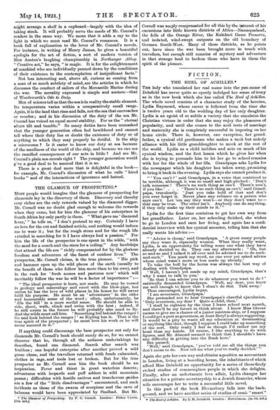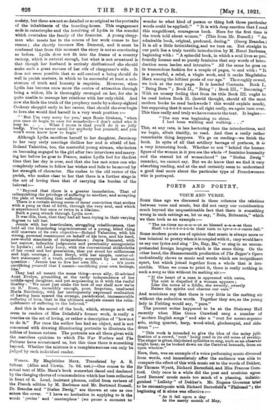FICTION.
THE HEEL OF ACHILLES.* The lady who translated her real name into the pen-name of Dolafield has never quite so openly indulged her sense of irony as in the now book which she has called The Heel of Achilles. The whole novel consists of a character study of the heroine, Lydia Raymond, whose career is followed from the time she is twelve years old to the wedding day of her only daughter. Lydia is an egoist of so subtle a variety that she simulates the Christian virtues in order that she may enjoy the pleasures of popularity, and until she comes to the acid tests of marriage and maternity she is completely successful in imposing on her home circle. There is, however, one exception, her grand- father, a cynical old gentleman who makes a tacit but unholy alliance with his little granddaughter to mock at the rest of the world. Lydia as a child imbibes and acts on much of his cynical wisdom, and the first lesson which he gives her when she is trying to persuade him to let her go to school remains with her for the whole of her life. Grandpa,pa, asks Lydia for the newspaper which his daughter has taken away, promising to bring it back in the evening. Lydia says she cannot produce it.
" You can't ? ' said Grandpapa, in a voice that contrived to be terrible, although it was so small and high-pitched : Don't talk nonsense ! There's no such thing as can't. There's won't, if you like.' . . . There's no such thing as can't,' said Grand- papa, truculently. Just you take hold of that and don't you ever forget it. Never place any reliance on a person who says can't. Let 'em say they won't—or they don't want to— that may be true. The other isn't. Anybody can do anything, if they only make up their minds to it."
Lydia for the first time contrives to get her own way from her grandfather. Later on, her schooling finished, she wishes to go to London and earn her living, and again has a confi- dential interview with her cynical ancestor, telling him that she really wants his advice :- "'Advice is cheap,' said Grandpapa. A great many people say they want it, especially women. What they really want, Lydia, is an opportunity for telling some one what they have already decided to do. They can say afterwards : " Oh, but so-and-so and I talked it all over and he advised me to do such- and-such." You mark my word, no one ever yet asked advice whose mind wasn't more or less made up already.'
To take the bull by the horns was always the best way of dealing with Grandpapa. Well, I haven't yet made up my mind, Grandpapa, that's why I want to talk to you.' So that I can advise you to do whatever you want to do ? ' satirically demanded Grandpapa. ' Well, my dear, you know me well enough to know that I shan't do that. Talk away.' Thus encouraged, Lydia began. I am seventeen, Grandpapa.' She pretended not to hear Grandpapa's cheerful ejaculation. Only seventeen, my dear ? Quite a child, then.'
I shall be eighteen by the time I leave school next month, and there'll be my future to think about. I know Miss Glover means to give me a chance of a junior mistress-ship, or I suppose I could get a post as governess, as Aunt Beryl is always suggesting. It would be a pity to waste all my education at dressmaking or anything like that, though I suppose I could take up something of the sort. Only really I feel as though I'd rather use my head than my hands. Of course, I like anything to do with figures, and Mr. Almond seemed to think that I shouldn't have any difficulty in getting into the Bank here.'
She paused. Well,' said Grandpapa, ' you've told me all the things you don't mean to do. Now tell me what you've really decided.' "
Again she gets her own way and obtains aposition as accountant in London, living at a boarding house, the inhabitants of which afford Miss Delafield an opportunity for a series of those finely etched studies of commonplace people in which she delights. Finally, after an unfortunate love affair, Lydia changes her situation for a private secretaryship to a Jewish financier, whose wife encourages her to write a successful little novel.
In this part of the book Bloomsbury falls into the back-. ground, and we have another series of studies of semi- "smart" • The Heel o!da4Uks. By Delaeld. London : Hutchinson. Via. &I. net.]
society, but these are not so detailed or so original as the portraits of the inhabitants of the boarding-house. This engagement ends in catastrophe and the involving of Lydia in the scandal which overtakes the family of the financier. A young clergy- man who meets her in the course of her work comes to her rescue ; she shortly becomes Mrs. Damerel, and it must be confessed that from this moment the story is not so convincing as before. Lydia does not fit into the frame of a country rectory, which is natural enough, but what is not sonatural is that though her husband is entirely disillusioned she should make such a great success of her role of clergyman's wife. It does not seem possible that so self-centred a being should do well in parish matters, in which to be successful at least a sub- stratum of truth and honesty is requisite. However, when Lydia has become once more the centre of attraction through
being a widow, life is thoroughly revenged on her, for she is
quite unable to manage her relations with her only child. And now she finds the truth of the prophecy made by a sharp-sighted Cockney shopgirl early in her career, that should she ever begin to love she would find herself in a very weak position :-
" But I'm very sorry for you,' says Rosie Graham, ' when you once do begin to care for somebody—I don't mind who it may be. . . . What I moan is that you'll do it so jolly badly. You've never cared for anybody but yourself, and you wont even know how to begin.' " Although Lydia sacrifices herself to her daughter, Jennie up to her very early marriage dislikes her and is afraid of her. Roland Valentine, too, the masterful young airman, who insists on becoming engaged to the girl after two interviews and marry- ing her before he goes to France, makes Lydia feel for the first time that her day is over, and that she has met some one who completely refuses to follow her wishes and fails to be moved by her strength of character. She rushes to the old rector of the parish, who makes clear to her that there is a further stage in the art of loving than that of carrying the burden of the beloved:—
"'Beyond that there is a greater immolation. That of relinquishing the privilege of suffering to another, and accepting the pain of watching that suffering.'
There is a certain strong sense of inner conviction that strikes with a pang as that of birth, through the very soul, and which is experienced but once or twice in a lifetime.
Such a pang struck through Lydia now. It was this, then, that they had all been trying in their varying degrees to tell her.
Jennie with her inarticulate, struggling rebelliousness, that held all the blundering ungraciousness of a young, blind thing still unaware of its own objective—Roland Valentine, with his strong, personal resentment on behalf of his love, and his hard, new-world standards of independence ; Joyce Demerol, with her narrow, inflexible judgments and personality antagonistic to Lydia's ; old Lady Lucy, with the conventional shibboleths of her creed and her generation, that yet stood for selflessness and high courage ; Aunt Beryl, with her simple, matter-of- fact statement of a truth evidently accepted by her without question : Jennie has to live her own life, . . . it's more sacrificing yourself that I meant—sacrificing your own feelings, like.'
They had all meant the same thing—even silly, ill-advised Aunt Evelyn, grumbling at the tardy independence of her middle-aged, daughter, and yet acquiescing in it with the rueful finality : We must just make the best of our shelf now we're on it.' Even, incredibly enough, poor, forgotten, unaltered
Maria Nettleship, with her uneloquently expressed realization of having been spared the strange, paradoxical, immeasurable suffering of love, that in the ultimate analysis meant the relin- quishment of suffering to the beloved."
And this is the moral of the book, which, strange as it will seem to readers of Miss Delafield's former work, is really a treatise on the art of loving, or rather a description of "hownot to do it." For once the author has had an object, and is not concerned with drawing illuminating portraits to illustrate the foibles of human nature. The portraits are all there given with the merciless cynicism to which The War Workers and The Pelicans have accustomed us, but this time there is something beyond. Whether the mixture is a complete success can only be judged by each individual reader.



































 Previous page
Previous page